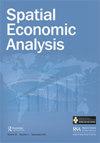羊群行为和集群的出现
IF 2.2
3区 经济学
Q2 ECONOMICS
引用次数: 5
摘要
聚集外部性通常被认为是集群形成的主要原因。这一理论并非毫无争议。我们通过将群体行为纳入这一过程的概念化,创造了一种关于集群的替代视角。使用了一个创新的基于代理的模型,其中集群的形成是根据个人的搬迁决策构建的。因此,它将个人的搬迁决策与宏观层面的突发模式联系起来,并表明模仿有可能严重加剧集聚经济对城市规模集群的影响。该模型的结果挑战了新古典主义关于聚类的主流观点。提出了另一种假设,即羊群行为和集聚外部性之间的相互作用作为集群形成的解释。本文章由计算机程序翻译,如有差异,请以英文原文为准。
Herd behaviour and the emergence of clusters
ABSTRACT Agglomeration externalities are generally credited as the prime cause of cluster formation. This theory is far from uncontroversial. We create an alternative perspective on clustering by integrating herd behaviour into the conceptualization of this process. An innovative agent-based model is used in which cluster formation is constructed from individual relocation decisions. It thus connects individual relocation decisions to macro-level emergent patterns and shows that imitation has the potential to severely exacerbate the effects of agglomeration economies on clustering on an urban scale. The outcomes of this model challenge the dominant neoclassical view on clustering. An alternative hypothesis is postulated in which the interaction between herd behaviour and agglomeration externalities is proposed as an explanation for cluster formation.
求助全文
通过发布文献求助,成功后即可免费获取论文全文。
去求助
来源期刊

Spatial Economic Analysis
ECONOMICS-
CiteScore
5.40
自引率
21.70%
发文量
33
期刊介绍:
Spatial Economic Analysis is a pioneering economics journal dedicated to the development of theory and methods in spatial economics, published by two of the world"s leading learned societies in the analysis of spatial economics, the Regional Studies Association and the British and Irish Section of the Regional Science Association International. A spatial perspective has become increasingly relevant to our understanding of economic phenomena, both on the global scale and at the scale of cities and regions. The growth in international trade, the opening up of emerging markets, the restructuring of the world economy along regional lines, and overall strategic and political significance of globalization, have re-emphasised the importance of geographical analysis.
 求助内容:
求助内容: 应助结果提醒方式:
应助结果提醒方式:


